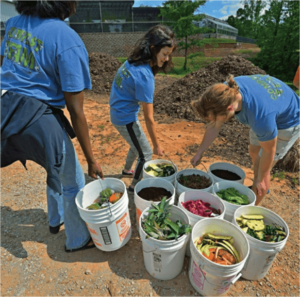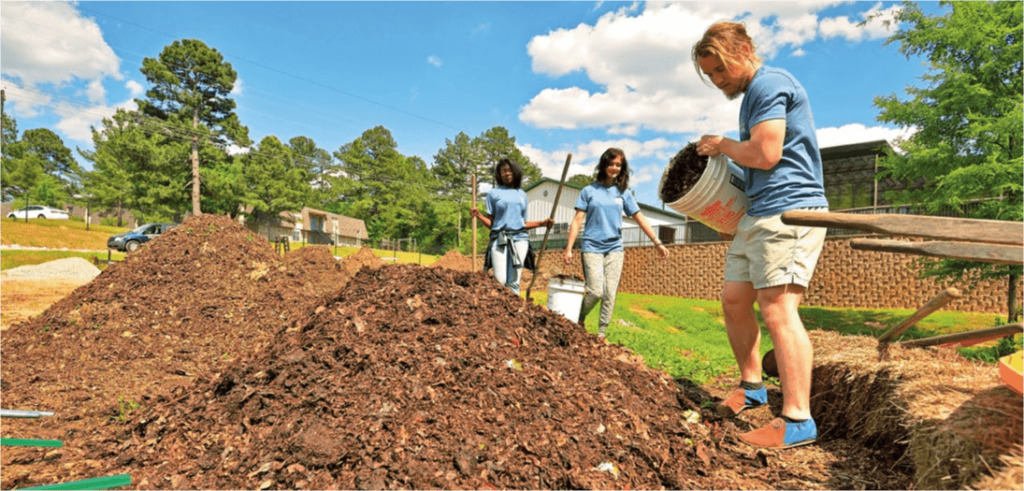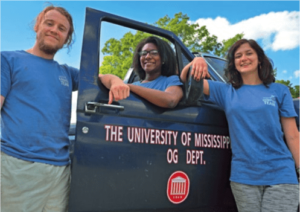
Green Team Turns Food Waste Into Nutrient-Rich Soil Amendment
This story was originally published in the Ole Miss Alumni Review Magazine’s Summer 2015 Issue. Story by Lindsey Abernathy. Photography by Robert Jordan
Like many college students, University of Mississippi senior Victoria Burgos heads to work after a full morning of classes. However, Burgos’ job leads her to an unconventional locale — the
numerous mounds of compost, all in various stages of decomposition, near the edge of campus. Where some see trash, the recreation administration major sees an opportunity for Ole Miss to reduce waste and create a usable product for community gardeners.
“Food waste isn’t actually waste,” explains Burgos, a founder of UM’s composting program, an initiative that has diverted nearly 34,000 pounds of campus food waste from the landfill since 2013. “It can be remade and reused into nutrient-dense, potable soil, and it sequesters greenhouse gases.”
According to the Environmental Protection Agency, food in landfills is a significant source of methane, a greenhouse gas that is 25 times more potent than the carbon dioxide that decomposing food gives off when breaking down naturally in a compost pile.
After six months, the compost, which began as food scraps such as banana peels, onion skins and coffee grounds, ends up looking and smelling like dirt. The finished product is distributed to campus and community members for use in their gardens.
“The product we get after composting, called humus, is really nutritious dirt that can help in soil amendment,” says Erik Hom, UM assistant professor of biology and a member of the compost program’s advisory board. “When mixed with soil, it helps retain moisture, provides important plant nutrients and is chock-full of beneficial microbes that improve plant growth. Among many benefits, it’s a great fertilizer, meaning we don’t have to use as many chemicals.”
Burgos first began working on the compost project as a freshman in 2012, when she proposed the idea to the newly established UM Green Fund, a donation-based funding source for innovative sustainability projects on campus. The pilot program launched in fall 2013 as a program of the UM Office of Sustainability and works in collaboration with Ole Miss Dining Services, operated by Aramark, and the School of Pharmacy’s Maynard W. Quimby Medicinal Plant Garden, where the compost piles are located.
For Richard Bradley (MBA 10), Aramark marketing manager, the partnership with the Office of Sustainability just made sense.
“We want to make sure that we’re reducing our waste,” Bradley says. “When we’re preparing food, any waste of the product — a fruit rind or trimmed piece of vegetable — is already being weighed and documented. We had that part of the system in place. Once we were done weighing it, we just had to put it into a receptacle that could be picked up by the Office of Sustainability.”
During the first year, the compost team employed four student interns who picked up kitchen scraps from the Marketplace at the Residential College, which serves about 1,500 students daily. The team composted nearly 3,500 pounds of food that year, creating 19 cubic yards of finished compost that was distributed to the Residential College Garden Club and other area gardens.

“That first year, we started [picking up food] just from the RC, which was awesome,” Burgos says. “We were a pilot program, and we had so many other issues to iron out that if we took on another place it probably would have been overwhelming. But, it was always written into the project to expand.”
At the end of the first year, students in associate professor of civil engineering Cristiane Surbeck’s environmental engineering course conducted an environmental impact analysis as a class project, making a strong case for expanding the program. The analysis took into account vehicle emissions, water use and emissions from the decomposing food.
“What we learned from Dr. Surbeck’s engineering students was that the environmental effect of our composting program with the volume from the pilot year was about even with the environmental effect of landfilling that same amount of waste,” says Anne McCauley, assistant director of the Office of Sustainability. “But, we learned that if we increased our volume even a small amount, it would tip the scale toward composting having an environmental benefit. We already had the operations in place, and we felt like we had the capacity to take on more.”
Following the analysis, Burgos and team members Tiara Mabry, a then-freshman psychology major from Tupelo, and Katelynn Dillard (BS 15), a then-junior biology major from Metairie, La., reapplied to the Green Fund to request funding for expansion.
After a summer of planning — including registering the program with the Mississippi Department of Environmental Quality — the team began picking up food from Rebel Market in August 2014, a 1,030 percent increase in monthly volume. To accommodate the expansion, the Office of Sustainability increased food pickups from three times weekly to daily.
“I wasn’t expecting nearly as much food as we ended up getting,” says Dillard, a former member of the compost team. “We had a projection that we were going to fill up this designated space for our first pile in seven weeks, and it took three weeks. That was sort of a wake-up call, like ‘Wow, we’re really composting a lot of food.’”
During the 2014-15 academic year, the team picked up an average of 1,065 pounds of food waste weekly, sometimes transporting more than 30 buckets to the piles at the Medicinal Plant Garden. In just one year, team members composted nearly 30,000 pounds of food waste and are in the process of preparing it for distribution.
The increased volume did have a positive effect on the project’s emissions — the 2014 environmental impact analysis found that the project reduced greenhouse gas emissions by more than 17 tons, compared to the alternative of sending the food to the Three Rivers Landfill, located in Pontotoc.
As the program enters its third year, it continues to expand. Beginning in August 2015, the project will include The Grill at 1810, located in the Olivia and Archie Manning Athletics Performance Center. The team will also pick up coffee grounds from two Einstein Bros. Bagels locations and two Starbucks locations on campus.
“Starting off, I really wasn’t expecting to undergo expansion every year,” says Burgos, who is entering her senior year. “I kind of thought I would see some upgrades before I graduated, but it’s actually grown every single year, which is really exciting. I think the sheer amount of waste we’ve taken in is a huge success.”

Digging In
A typical day for Burgos and the other members of the compost team entails donning mud-caked boots and setting out to collect buckets of kitchen scraps from the loading docks behind Rebel Market and the Residential colleges. The 5-gallon buckets are stacked and waiting, filled with anything from pineapple tops and mango peelings to chocolate chip cookies, depending on the day. The team measures, weighs and inspects each bucket for usability — the project does not compost meat or dairy products, which might attract pests — before transporting it to the Medicinal Plant Garden for composting.
“Composting is a really natural process,” says UM biology instructor Tiffany Bensen, who also serves on the project’s advisory board. “Decomposers like bacteria and fungi do this really good job of breaking down old, unwanted, decaying organic matter into raw materials that we can reuse again.”
At the garden, the team mixes the food with leaves from the City of Oxford, wood chips provided by Landscape Services and other “brown material,” which adds a source of carbon to the nitrogen-rich organic matter. Another vital step in the process involves turning the compost piles to allow for oxygen flow, one of the major differentiators between composting food and sending it to a landfill, Hom says. Currently, Medicinal Plant Garden staff handles turning the piles for the team.
Each year, Americans send more than 30 million tons of food waste to landfills, which account for more than 20 percent of the nation’s methane emissions, according to the EPA.
“The concern people have with this is that methane is a ‘greenhouse gas’ — which means that it effectively traps heat generated on this planet, which thus leads to global warming,” Hom says. “Suffice it to say, excess methane in our air is not a good thing and is a substantially more potent greenhouse gas than carbon dioxide. Composting, on the other hand, does not lead to methane production because the sort of degradation that goes on there is largely aerobic — it takes place with oxygen present. The main gas coming out of compost piles is carbon dioxide, the stuff that we breathe out, which is far better than methane release.”
Composting 101 – Educating The Campus Community
In addition to reducing the university’s environmental impact, a large focus of the UM composting program is outreach and education. The team sets up educational displays during campus events, and signage in Rebel Market and the Marketplace explains the purpose of the program.
“Our outreach and awareness efforts are one of the most important things,” Burgos says. “As long as people know this is actually happening on campus, it becomes a part of campus culture. It will just come to be readily accepted as something that we do.”
In April, the team’s members sifted a portion of the finished compost, a process that removes larger particles and results in a better product for gardens. To increase the project’s visibility, they set up a display on the Student Union Plaza. Landscape Services transported 16 cubic yards of compost to the plaza, where student volunteers and Office of Sustainability staff sifted and explained what they were doing to onlookers.
“We thought that sifting in front of the Union would be a great place because it’s very visible to the students,” says Ellen Olack (BA 15), who interned in the Office of Sustainability during spring 2015.
“I enjoyed it because while I was sifting, a lot of students came up to us not knowing what we were doing or why we were doing it. They got to learn the importance of composting and see how easy and fun it could be to compost.”
Will Bedwell (BA 15), a former student member of the Green Fund Committee, says that, in part, the potential for educational impact was what got the attention of the committee.
“We liked that it was very educational,” Bedwell says. “The program operates where students are eating, so it’s something that is apparent to students. It was also an educational opportunity for Burgos, who ran it, and the chemical engineering students who also got involved.”
Outreach extends beyond the student body. During the first year of the program, the team tossed out 35 percent of food it collected due to contamination by meat scraps, dairy and other substances. To address the issue, Burgos and McCauley conducted orientations for kitchen staff, explaining the purpose of the project. Following the orientation, the percentage of usable food scraps increased to 99 percent.
Growing Pains
A common theme among those involved in the program is the desire to see it continue to operate and grow.
“I would think that within the next five years, most every dining location could be a part of the program,” Bradley says.
“Long term, I’d like to see us create a zero-waste facility. Right now when I say it, it’s a very big goal to set, but if we keep taking these small steps, I think we could accomplish things like that.”
However, as the operation grows, the compost team is faced with new challenges, ranging from locating space for more piles to the need to identify a new funding source. As the Green Fund, which receives a $15,000 baseline donation from the university each year, gets increased project proposals, funding the compost project long term will no longer be feasible.
“The idea with the Green Fund is that it helps projects get started, and then they get institutionalized into the university,” Bedwell says.
Additionally, the expansion to The Grill at 1810 has put the project at capacity in terms of space at the Medicinal Plant Garden. The Office of Sustainability is working to identify space that can be used in addition to its current location. But creative problem solving is a mainstay of the compost program. The team’s primary vehicle, a well-used truck bearing the words “OG DEPT.” on the side — the only letters left in “biology” in its past life as a biology departmental vehicle — is continually presenting problems; this fall, the team will pilot a hybrid electric bicycle equipped with a trailer as a potential replacement.

“From the beginning, everything about this project was new to us,” McCauley says. “We’ve not allowed uncertainties or challenges to intimidate us from going forward.”
As for Burgos, she will spend her senior year orienting a new team of student interns, whom she hopes will value the program as she has and see it through new growth after her graduation.
“This experience has been pretty transformative,” Burgos says. “I’m really proud of where we are, and I want to see the program grow more and more. The end goal is to take every bit — pre-and post-consumer — from every place that has food on this campus.”
For questions or comments email Hottytoddynews@gmail.com.
Recent Comments